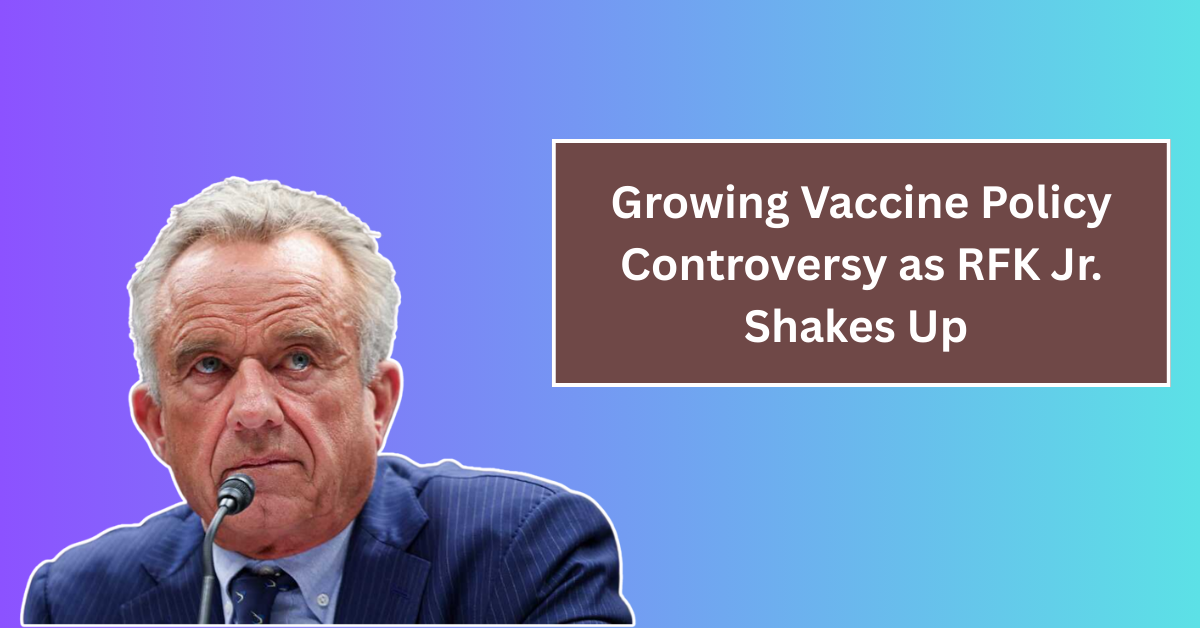The recent appointment of Robert F. Kennedy Jr. to key immunization advisory panels at the Centers for Disease Control and Prevention (CDC) has ignited a heated firestorm in the vaccine policy arena. Known for his controversial views on vaccines, Kennedy’s influence is stirring debate among public health officials, policymakers, and the general public. This shakeup has prompted a wave of bipartisan criticism, reflecting the mounting tension around vaccine mandates and safety concerns in America today.
With public trust in health institutions facing unprecedented challenges, the reshuffling of CDC immunization committees is sparking a critical examination of vaccine regulations and guidance. As younger generations engage more actively in health conversations online, the controversy underscores the complicated intersection between science, policy, and public opinion, potentially reshaping the future of immunization efforts nationwide.
The Role and Importance of CDC Immunization Panels
The CDC immunization advisory panels are crucial bodies that provide expert recommendations on vaccine schedules, safety, and policy implementation. These panels help determine which vaccines are recommended for children and adults, influencing public health protocols across the United States. Their guidance is typically based on extensive scientific research and data analysis, aimed at minimizing disease outbreaks and maximizing vaccine effectiveness.
Decisions made by these committees impact millions, shaping public health strategy and affecting how vaccines are communicated and administered. Their work ensures that the vaccination process remains guided by evidence, balancing the urgency of preventing illnesses with safety assurances. However, the recent appointments have sparked questions about whether these foundational principles are being challenged.
Who is Robert F. Kennedy Jr. and Why His Appointment Matters
Robert F. Kennedy Jr. is an environmental attorney turned vaccine skeptic, known for consistently questioning vaccine safety and federal vaccination policies. His views often contradict the consensus within the scientific and medical communities, which overwhelmingly support vaccine efficacy and safety backed by rigorous studies. Kennedy’s involvement with prominent anti-vaccine groups has made his entry into CDC advisory panels highly contentious.
The significance of his appointment lies in his potential to influence vaccine policy at one of the highest levels. Critics argue that his presence could undermine established scientific standards and fuel misinformation, while supporters believe he introduces needed debate around vaccine safety transparency. This polarization reflects larger societal divides about trust in government health institutions and the science behind vaccines.
Bipartisan Response to the CDC Immunization Panel Shakeup
One of the most notable aspects of this controversy is the bipartisan nature of the backlash. Both Democratic and Republican lawmakers have expressed concerns over Kennedy’s addition to the CDC panels. Many fear his well-documented skepticism could disrupt the consensus-driven process necessary for public health decisions related to vaccinations.
Lawmakers argue that vaccine policy should prioritize scientific integrity and public safety rather than personal or partisan viewpoints. This unified concern across party lines underscores the gravity of the situation and indicates broad agreement on maintaining rigorous, evidence-based immunization standards within federal health agencies.
Impact on Public Trust and Vaccine Uptake
The reshuffling of CDC advisory panels amid this controversy may influence public perceptions of vaccine safety and efficacy. Vaccine hesitancy, already a significant challenge particularly among younger demographics, risks being amplified by conflicting messages from trusted advisories. When advisory panels include voices with controversial stances, it can create confusion and doubt.
Increasing numbers of young Americans rely on social media and online communities for health information, making consistent, science-backed messaging more important than ever. If public trust erodes, vaccination rates could decline, leading to higher susceptibility to outbreaks of preventable diseases and threatening herd immunity achievements made in recent years.
Scientific Consensus vs. Misinformation Dynamics
Scientific consensus on vaccines supports their safety, effectiveness, and critical role in preventing infectious diseases. These conclusions come from decades of global research and millions of vaccine doses administered without significant safety concerns for the vast majority of recipients. However, misinformation about vaccines spreads quickly, often fueled by high-profile figures challenging that consensus.
Robert F. Kennedy Jr.’s presence in the CDC immunization panels adds considerable momentum to the misinformation debates, complicated further by the partisan backlash it has triggered. Understanding the distinction between credible science and discredited claims is key to navigating this turbulent landscape and ensuring public health policies remain grounded in fact.
Statistical Overview: Vaccine Coverage Trends and Public Opinion
| Metric | Pre-Controversy Data | Emerging Trends Post-Shakeup |
|---|---|---|
| Childhood Vaccine Coverage | High rates exceeding 90% for key vaccines | Signs of plateauing or slight decline in some regions |
| Adult Vaccination Rates | Steady improvements in flu and COVID-19 vaccines | Increased hesitancy linked to conflicting messages |
| Public Trust in CDC | Generally moderate to high across demographics | Growing polarization and skepticism among younger groups |
This table highlights how vaccine coverage and public trust are being affected amid the CDC advisory panel reshuffle. While overall vaccine uptake remains strong, subtle shifts already reflect the influence of emerging controversies and the importance of maintaining clear, unified communication efforts.
Implications for Future Vaccine Policies and Public Health Strategy
The current vaccine policy controversy may have long-lasting repercussions on how vaccines are developed, recommended, and mandated. Public health officials must navigate the delicate balance of incorporating diverse perspectives while safeguarding scientific rigor. Ensuring transparency and community engagement without compromising on proven data will be essential.
Going forward, it might be necessary to develop new protocols for advisory panel appointments to prioritize scientific qualifications and minimize potential conflicts of interest. This approach could help rebuild confidence and foster cooperative dialogue across political and social lines.
How Younger Audiences are Engaging with Vaccine Policy Debates
Younger generations are playing a pivotal role in shaping vaccine discourse through social media platforms and digital communities. Their engagement is marked by a desire for authenticity, transparency, and accessible information. They tend to challenge traditional authorities more than older populations and seek diverse viewpoints before forming opinions.
This demographic’s interaction with vaccine policy controversies often drives rapid changes in public sentiment. Therefore, health communicators must adapt messages and outreach strategies to resonate with younger audiences, accounting for their unique values and information consumption habits.
Balancing Transparency and Scientific Authority in Health Decisions
Transparency is fundamental to building and maintaining public trust in vaccine recommendations. However, excessive emphasis on unverified claims or giving equal platform to fringe views can undermine authority. The CDC and other health agencies face the challenge of demonstrating openness while firmly supporting scientifically validated policies.
One possible approach is to increase community involvement in decision-making processes and education campaigns to explain the scientific basis behind vaccine policies. This strategy can empower individuals with facts while respecting diverse perspectives, ultimately fostering a more informed and cooperative public.
Conclusion: Navigating the Vaccine Policy Crossroads
The introduction of Robert F. Kennedy Jr. into the CDC immunization advisory panels has served as a catalyst, intensifying debates over vaccine policy and public trust. As bipartisan backlash mounts, the broader implications for public health, vaccine uptake, and community confidence come into sharp focus. The evolving situation demands careful leadership to ensure that vaccine policies continue to protect and promote health based on sound science.
For younger audiences especially, the controversy highlights the importance of critically evaluating information sources and advocating for transparent, evidence-based health policies. Moving forward, navigating this crossroads thoughtfully will be key to safeguarding the health of the nation and preserving the gains made through decades of vaccination efforts.




